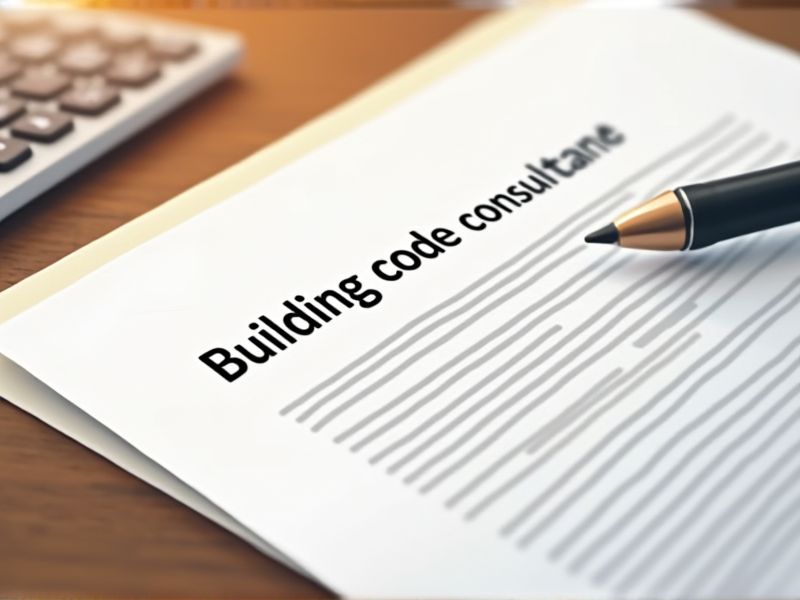
Building code consultants play a crucial role in ensuring that construction projects comply with safety and regulatory standards. The complexity of modern building codes requires consultants to possess specialized knowledge and skills beyond general construction expertise. Certain certifications validate a consultant's proficiency in code interpretation, plan review, and compliance methodologies. Important certifications necessary for a building code consultant include:
ICC Certified Building Official (CBO)
An ICC Certified Building Official (CBO) possesses comprehensive knowledge of building codes, ensuring projects comply with regulations and promote safety. Their expertise mitigates risks of construction errors and potential legal liabilities, safeguarding public welfare. CBOs help streamline project approvals by effectively communicating with stakeholders, reducing delays. Their certification signifies a commitment to ongoing education, keeping pace with evolving standards and technologies.
ICC Certified Code Enforcement Officer (CCEO)
The presence of an ICC Certified Code Enforcement Officer (CCEO) ensures adherence to established building codes, safeguarding public safety and compliance. Their expertise helps in identifying potential code violations, leading to proactive mitigation of risks associated with non-compliance. With their certification, CCEOs possess the knowledge required to interpret and apply complex code regulations, facilitating smoother project approvals. Employing a CCEO enhances trust and transparency between building stakeholders and regulatory bodies, minimizing disputes and construction delays.
ICC Certified Fire Inspector (CFI)
A building code consultant relies on an ICC Certified Fire Inspector to ensure fire safety compliance in accordance with local and international standards. This certification helps identify fire hazards, contributing to effective risk management within building structures. It brings expertise that enables accurate interpretation and application of complex fire codes and regulations. Effective collaboration with an ICC CFI enhances project credibility and can expedite the approval process from regulatory bodies.
OSHA 30-Hour Construction Industry Outreach Training
The OSHA 30-Hour Construction Industry Outreach Training is essential for building code consultants because it provides comprehensive knowledge about safety standards that directly impact construction site safety and regulatory compliance. A thorough understanding of these safety standards improves a consultant's ability to identify potential hazards, thereby reducing the risk of accidents and ensuring a safer working environment. Compliance with OSHA guidelines is critical for maintaining legal standards, and this training enhances a consultant's credibility and effectiveness in advising on building codes. The training equips consultants with practical safety strategies that can be integrated into project planning and execution, aligning both safety and building code requirements.
LEED Accredited Professional (LEED AP)
A LEED Accredited Professional is essential for building code consultants because they possess specialized knowledge in sustainable design and green-building practices. This expertise ensures that construction projects comply with evolving environmental regulations and achieve optimal energy efficiency. A LEED AP's involvement enhances a project's marketability due to increased building performance and sustainability certifications. Their guidance helps in navigating complex LEED requirements, reducing potential delays and additional costs associated with non-compliance.
Certified Construction Manager (CCM)
Certified Construction Managers (CCM) possess the specialized expertise to ensure that construction projects align with established building codes and regulations. Their certification demonstrates a standard of excellence and reflects a commitment to continuous professional development, which can help prevent costly code violations. Their involvement in a project can streamline the approval processes with local authorities, reducing delays associated with compliance issues. By overseeing the adherence to building codes, CCMs can significantly minimize the risks associated with safety and structural integrity concerns.
Certified Energy Manager (CEM)
Certified Energy Managers possess specialized knowledge in energy efficiency and sustainable practices, crucial for evaluating and optimizing building performance. Building code consultants rely on CEMs to ensure compliance with stringent energy codes and standards. The expertise of CEMs aids in identifying cost-effective measures for reducing energy consumption and enhancing building operations. By integrating CEM insights, building projects achieve not only regulatory compliance but also long-term energy savings and environmental benefits.
Certified Building Commissioning Professional (CBCP)
The need for a Certified Building Commissioning Professional (CBCP) arises as they ensure that building systems are designed, installed, and operate according to the owner's requirements. Compliance with building codes often demands verification of system performance, which CBCPs provide through rigorous testing and documentation. Their expertise minimizes operational issues and reduces energy consumption by confirming that system integrations achieve optimal efficiency. A CBCP's knowledge assists building code consultants in navigating complex regulations, saving time and resources in project completion.
Certified Accessibility Inspector (CAI)
A Certified Accessibility Inspector ensures that buildings comply with legal accessibility standards, reducing the risk of non-compliance penalties. Their expertise in identifying potential barriers in design plans leads to more inclusive environments for individuals with disabilities. Knowledge in accessibility codes contributes to efficient navigation of regulatory requirements, minimizing project delays. Involving a CAI in early project stages aids in seamless integration of accessibility features, enhancing both functionality and aesthetic value.
National Institute of Building Sciences (NIBS) Certification Programs
NIBS Certification Programs provide building code consultants with standardized knowledge, which enhances consistency and reliability across the industry. Expertise acquired through these programs helps consultants effectively navigate complex building codes, reducing errors and project delays. Certification can increase a consultant's credibility, making them more attractive to clients seeking well-qualified professionals. As building codes evolve, ongoing education from NIBS ensures that consultants remain up-to-date, aligning with current regulations and technologies.
Summary
With proper certifications, you gain a competitive edge in the building code consultation industry. Clients are likely to place more trust in your expertise, leading to increased job opportunities. Enhanced credibility can result in higher rates, boosting your financial returns. Recognition from certifications may also facilitate your professional networking and growth.
